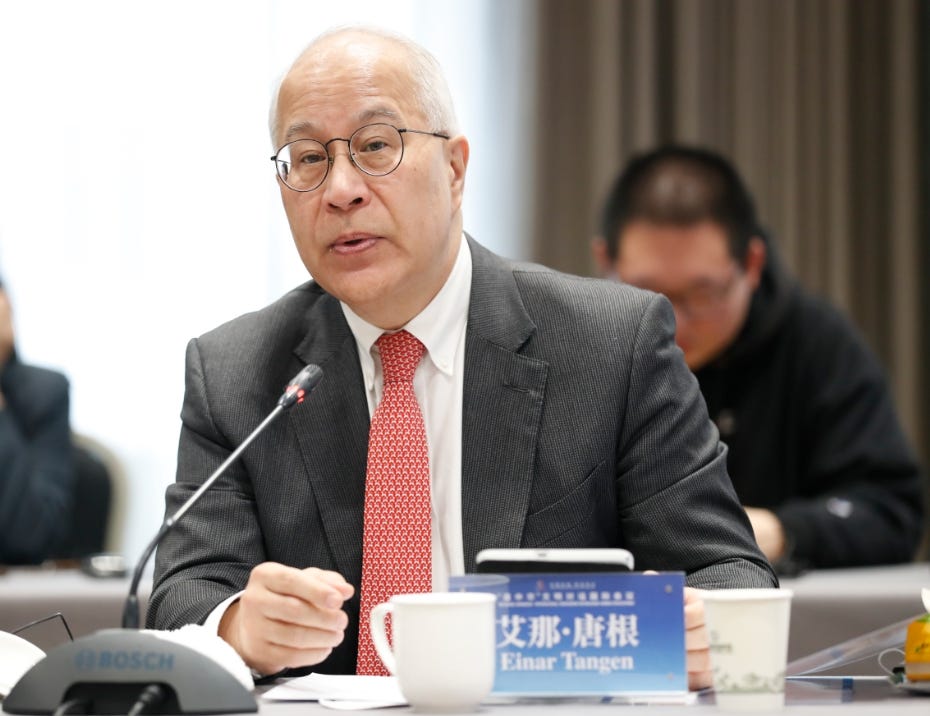Einar Tangen

The necessity of moving from a world where it's about power to a world where it's about morality is because we have sovereign nations that must come together and reach some sort of consensus. The time when one country can dictate what happens in the world has passed.
The world is in the midst of a paradigm shift from the post-World War II top-down coercive order based on American hegemony to a bottom-up multipolar political, economic, and social orders which is in search of a common understanding that can deliver a shared future for mankind.
While the U.S. continues to cling to its recent past, China has looked further into its history towards examples of times and thoughts that allowed China to maintain harmony in the midst of differences. This effort has been named the Global Civilization Initiative.
The Global Civilization Initiative is about a world order based on aspirations rather than coercion.
It relies on a set of philosophical assumptions dating back to the Shang Dynasty (1600–1046 BC), which formed the assumptions of He (和) He (合) thought that followed. In essence, harmonious coexistence depends on the moral quality of the people and their ability to understand and accept the value of "he" (和, meaning harmony), and "he" (合, meaning unity).
I want to really emphasize that we move from a world where it's about power to a world where it's about morality. The necessity of that is because we have, sovereign nations who have to come together, and come to some sort of consensus. This is no longer a situation where one country can dictate what happens in the world. That has passed.
He He culture evolved in Taizhou, a coastal city in eastern China's Zhejiang provice, surrounded on three sides by mountains and the sea to its East. It was there, like the confluence of waters flowing from the mountains, that three powerful philosophical schools of thought, Confucianism, Taoism and Buddhism converged.
Remarkably, instead of competing, they coexisted in harmony and evolved. In the case of Buddhism, teachings developed in Taizhou became the foundation of Japanese Buddhism.
The same spirit lives on in Taizhou today, and has been responsible for its success in a land that is beautiful, but challenged in terms of physical resources.
Xi Jinping, who spent time as a leader in Zhejiang Province, described He He Culture in his work Zhejiang, China: A New Vision for Development like this:
"Our ancestors created an incomparable culture, a quintessential part of which is the He He culture. The first 'He' of He He indicates harmony, peace, and balance. The second 'He' indicates convergence, unity, and cooperation. Such inclusiveness is reflected in the traditional thinking of 'valuing harmony and esteeming balance,' 'being understanding and open-minded,' 'embracing the world through virtue,' and 'living in harmony without uniformity.' This is a cultural ideal that our people seek. Harmony between nature and society and between the individual and the group is the ideal of our people and the basis of our cohesiveness and creativity."
The historical roots of He He thought date back to the Shang Dynasty, over 3,500 years ago. Social relations were based on the moral obligations of individuals to their families and societies. These included righteousness, amiability, amicability, politeness, and filial piety, beyond those, matters of opinions could differ.
The Global Civilization Initiative emphasizes that global harmony depends on co-existence, not coercive insistence on uniformity. It draws heavily from He He Culture's simple truths: people's thoughts will differ, but if they are morally and socially responsible, they can exist harmoniously, as long as there is no self-righteous insistence on uniformity.
The strength of He He culture is its simplicity. There are no ideological components, just a simple structure and a few shared basic values that can allow individuals and groups to exist in harmony, perhaps something for the world to adopt.
Every civilized culture values "respect" and "responsibility." By starting with what we agree on, we can learn and tolerate differences, as our differences are understood and tolerated by others. This is the basis of harmony without uniformity.
While most understand what is expected, it does not mean that all follow. When it comes to those in power, under He He culture, leading by example is a requirement. Morality is the bedrock of personal, social, and political relations, without morality, there is no cohesive society, no meaningful connections, no harmony and therefore no legitimacy. If those who are in power are not moral, there is no hope that the society around them will be moral.
As the world faces serious differences and crises, we as people and nations need to build the trust for us to act together. China is simply offering the example of what it has learned over thousands of years, as a means to create a more harmonious global society, one where differences of belief can exist harmoniously, if we as individuals act morally, and socially, responsible.
The alternatives are a Westphalian moment, when we have been so sickened by death and destruction. We accept peace from exhaustion, or we fail to cooperate and become extinct.
Einar Tangen, a senior research fellow of Taihe Institute, and a famous American commentator.
The article excerpts from Einar Tangen, Jr.'s speech delivered in the "Decoding Zhonghua" International Conference on Dialogue among Civilizations in Beijing on January 17, 2024.
The views don't necessarily reflect those of DeepChina.
Editor/ Liu Xian
Related articles
Chief Editor/ Yang Xinhua
Coordination Editor/ Liu Xian
Reviewer/ Liu Li
Copyeditor/ Zhang Weiwei
Image Editor/ Tan Yujie
About DeepChina
DeepChina is an elite academic initiative that offers objective and rational analyses on a broad spectrum of topics related to China, encompassing politics, economics, culture, human rights, diplomacy, and geopolitics.






Thank you posting, it is an honor.